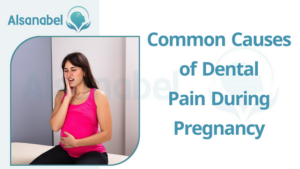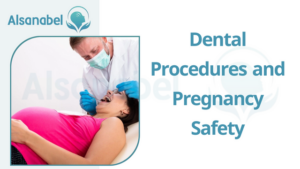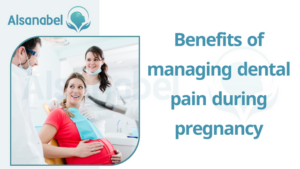During pregnancy, many women may experience dental pain or discomfort. This can be due to hormonal changes, increased blood flow to the gums, and changes in oral health habits. Common dental pain during pregnancy include gum inflammation, tooth decay, and pregnancy-related gingivitis. It is essential to address dental pain promptly to ensure the health of both the mother and the developing baby.
Importance of addressing dental pain during pregnancy
Managing dental pain during pregnancy is crucial for several reasons. Firstly, untreated dental problems can affect the overall health and well-being of the expectant mother. Dental infections can spread to other parts of the body, leading to more significant health issues. Additionally, gum disease during pregnancy is linked to complications such as premature birth and low birth weight.
Addressing dental pain and maintaining good oral health during pregnancy is also important for the baby’s development. Poor oral health in the mother has been associated with an increased risk of dental problems in the child later in life. By managing dental pain and ensuring proper oral hygiene, expectant mothers can reduce the risk of passing on oral health issues to their children.
Common Causes of Dental Pain During Pregnancy

Hormonal changes and their effects on dental health
During pregnancy, hormonal changes can have a significant impact on a woman’s dental health. Fluctuations in hormone levels, particularly increased levels of progesterone, can lead to several oral health issues. These hormonal changes can affect the gums, making them more sensitive and prone to inflammation or gingivitis. Pregnant women may also experience swollen, tender, or bleeding gums, which can contribute to dental pain and discomfort.
Increased susceptibility to gum disease during pregnancy
Pregnant women are more susceptible to gum disease, also known as periodontal disease, due to hormonal changes and increased blood flow to the gums.
Gum disease occurs when the bacteria in plaque build up and cause inflammation. If left untreated, gum disease can lead to more severe complications, such as tooth loss and bone damage. It is essential for expectant mothers to address gum disease promptly to prevent dental pain and potential complications.
Other factors contributing to dental pain during pregnancy include changes in oral health habits and lifestyle. Pregnancy cravings and morning sickness can lead to an increased consumption of sugary foods, which can contribute to tooth decay and cavities. Additionally, certain medications may not be safe for use during pregnancy, limiting the options for dental pain management.
It is crucial for pregnant women to maintain good oral hygiene practices to minimize dental pain and complications. This includes brushing twice a day with a fluoride toothpaste, flossing daily, and visiting the dentist regularly for check-ups and cleanings. Pregnant women should also inform their dentist of their pregnancy so that appropriate precautions can be taken during dental procedures.
Preventive Measures for Dental Pain During Pregnancy
Maintaining good oral hygiene habits
During pregnancy, it is crucial for expectant mothers to prioritize their oral health to prevent dental pain and complications. Here are some preventive measures to help manage dental pain during this important stage of life:
- Brushing and flossing: It is essential to continue brushing your teeth twice a day with a fluoride toothpaste and flossing daily. This will help remove plaque and bacteria, reducing the risk of tooth decay and gum disease.
- Use a soft-bristled toothbrush: Opt for a soft-bristled toothbrush to gently clean your teeth and gums. Hard or medium-bristled brushes can irritate sensitive gums and cause discomfort.
- Rinse with mouthwash: Using an antimicrobial mouthwash can help reduce bacteria in the mouth and prevent gum disease. Make sure to choose a mouthwash that is safe for use during pregnancy and follow the instructions for use.
Importance of regular dental check-ups and cleanings
Regular dental check-ups and cleanings are essential during pregnancy to maintain optimal oral health. Here’s why they are important:
- Early detection and treatment: Regular dental visits allow your dentist to identify any potential oral health issues early on. This includes detecting tooth decay, gum disease, or other dental problems that may cause pain or discomfort.
- Professional cleaning: Professional dental cleanings help remove plaque and tartar buildup that cannot be effectively removed with brushing and flossing alone. This reduces the risk of gum disease, which can contribute to dental pain.
- Precautions during dental procedures: Informing your dentist of your pregnancy is crucial so that they can take appropriate precautions during any necessary dental procedures. This ensures the safety of both you and your baby.
By maintaining good oral hygiene habits and seeking regular dental care, expectant mothers can reduce the risk of dental pain during pregnancy and promote overall oral health.
Safe Treatment Options
Medication options for managing dental pain
When experiencing dental pain during pregnancy, it is important to choose safe and suitable medication options. Here are some options that can help provide relief:
- Acetaminophen (Tylenol): This is generally considered safe for pregnant women and can help alleviate mild to moderate dental pain. However, it is recommended to consult with your healthcare provider before taking any medication.
- Topical numbing gels and ointments: These over-the-counter options can help temporarily numb the affected area, providing temporary relief from pain and discomfort. Just be sure to choose products that are specifically recommended for pregnancy.
- Antibiotics: In some cases, dental pain may be caused by an infection that requires treatment with antibiotics. Your dentist will carefully assess your situation and prescribe a safe antibiotic if necessary.
It is important to note that nonsteroidal anti-inflammatory drugs (NSAIDs) such as ibuprofen, aspirin, and naproxen, should be avoided during pregnancy as they can potentially harm the unborn baby.
Non-pharmaceutical approaches for pain relief
In addition to medication, there are non-pharmaceutical approaches that can help manage dental pain during pregnancy. These include:
- Saltwater rinses: Mixing salt in warm water and using it as a mouth rinse can help reduce inflammation and provide temporary relief from dental pain.
- Cold compress: Applying a cold compress or ice pack to the affected area can help numb the pain and reduce swelling.
- Good oral hygiene: Maintaining good oral hygiene practices, such as brushing and flossing regularly, can help prevent dental issues that may cause pain. Using a soft-bristled toothbrush and being gentle with the gum area is important.
- Relaxation techniques: Engaging in relaxation techniques, such as deep breathing exercises or meditation, can help reduce stress and alleviate dental discomfort.
It is crucial to consult with your dentist or healthcare provider before trying any medication or non-pharmaceutical approaches, as they will be able to provide personalized guidance and ensure the safety of both you and your baby.
Managing Dental Pain During Each Trimester
First trimester considerations
During the first trimester of pregnancy, it is crucial to prioritize the health and safety of both the mother and the developing baby. When it comes to managing dental pain, there are a few important considerations for expectant mothers during this stage.
First and foremost, communication with your dentist is key. Inform them about your pregnancy as soon as possible, as they may need to adjust their treatment approach accordingly. Certain dental procedures, such as X-rays and elective treatments, are typically avoided during the first trimester to minimize any potential risks.
To alleviate dental pain during the first trimester, non-pharmaceutical approaches are generally recommended. This includes using saltwater rinses to reduce inflammation and temporarily relieve pain. It is also important to continue practicing good oral hygiene by brushing and flossing regularly, but be sure to choose a soft-bristled toothbrush and be gentle with the gum area.
Second trimester considerations
The second trimester is often considered the safest period for dental treatments. Many routine dental procedures can be performed during this stage, as the baby is more developed and the risk of developmental issues is relatively low. However, it is still important to inform your dentist about your pregnancy.
When it comes to managing dental pain during the second trimester, the same non-pharmaceutical approaches can be utilized. Saltwater rinses and good oral hygiene practices are still recommended. Additionally, applying a cold compress or ice pack to the affected area can help numb the pain and reduce swelling.
It is important to note that any medication or treatment, including topical gels and ointments, should only be used under the guidance of your dentist or healthcare provider. They will be able to assess your specific situation and recommend safe options if necessary.
Dental Procedures and Pregnancy Safety
When it comes to managing dental pain during pregnancy, it is important to consider the safety of various dental procedures. While some treatments can be safely performed, others may require certain precautions or delay until after the pregnancy.

Here are some common dental procedures and their safety considerations during pregnancy:
- Dental cleanings: Routine dental cleanings, including professional teeth cleaning and gum evaluation, are generally safe during pregnancy. However, it is essential to inform your dentist about your pregnancy so that they can tailor the treatment accordingly.
- X-rays: X-rays are typically avoided during the first trimester due to the potential risk to the developing baby. However, in case of a dental emergency or urgent need, your dentist may use a lead apron to shield your abdomen and restrict the X-ray to only the necessary area.
- Fillings and restorations: Non-elective dental procedures, such as fillings and restorations, can usually be performed during pregnancy. Your dentist may recommend using a local anesthetic with minimal or no epinephrine to ensure safety.
- Root canals: Root canals, which involve removing infected pulp from the tooth, are generally considered safe during pregnancy. However, it is important to consult with your dentist and obstetrician for personalized advice.
Precautions to consider for dental treatments during pregnancy
While dental procedures can be safe during pregnancy, it is vital to take certain precautions to ensure the well-being of both the mother and the baby. Here are some precautions to consider:
- Timing: If possible, it is ideal to schedule non-urgent dental treatments during the second trimester when the risk to the baby is relatively low.
- Inform your dentist: It is crucial to inform your dentist about your pregnancy as soon as possible. This information will help them customize the treatment plan and consider any potential risks or precautions.
- Medications: Some medications, such as antibiotics or painkillers, may be prescribed during dental treatments. It is essential to inform your dentist about your pregnancy so that they can choose safe medications if necessary.
- Comfort: During dental procedures, your comfort and well-being are important. Your dentist may use additional cushions or adjust the chair positioning to provide maximum comfort during treatment.
Tips for Preventing Dental Pain After Pregnancy
Oral care tips for postpartum dental health
After pregnancy, it’s important to continue taking care of your oral health to prevent dental pain and maintain a healthy smile. Here are some tips to help you prioritize your postpartum dental care:
- Maintain a consistent oral hygiene routine: Brush your teeth twice a day with fluoride toothpaste and a soft-bristle toothbrush. Don’t forget to floss daily to remove plaque and food particles from between your teeth.
- Stay hydrated: Drinking plenty of water helps wash away bacteria and prevents dry mouth, which can increase the risk of tooth decay. It’s especially important if you’re breastfeeding as it can cause dry mouth.
- Watch your diet: Opt for a balanced diet that includes plenty of fruits, vegetables, and dairy products. Limit your intake of sugary and acidic foods and beverages, as they can contribute to tooth decay and enamel erosion.
- Continue regular dental check-ups: Schedule a dental appointment for a check-up and professional cleaning. Your dentist can identify any dental issues early on and provide appropriate treatment.
- Consider dental treatments: If you experience any dental pain or have concerns about your oral health, don’t hesitate to consult your dentist. They can recommend safe dental treatments and pain management options specific to your situation.
The importance of continued oral hygiene after pregnancy
Continuing good oral hygiene practices after pregnancy is crucial for maintaining oral health and preventing dental pain. Pregnancy can affect your oral health due to hormonal changes and certain habits like increased snacking or neglecting oral hygiene.
By prioritizing your oral care, you can prevent dental problems such as gum disease, tooth decay, and tooth sensitivity. These issues can cause pain, discomfort, and even affect your overall well-being.
By practicing good oral hygiene habits and seeking professional dental care, you can ensure a healthy smile and prevent dental pain after pregnancy.
When to Seek Dental Care During Pregnancy
During pregnancy, it’s important to prioritize your dental health to ensure the well-being of both you and your baby. While routine dental care is generally safe during pregnancy, there are certain signs and symptoms that require immediate attention from a dentist.
Here are some indicators that you should seek dental care:
- Severe toothache: If you experience intense pain in your tooth or jaw, it could be a sign of an infection or tooth decay that needs to be addressed promptly.
- Gum bleeding and swelling: Hormonal changes during pregnancy can make your gums more sensitive and prone to inflammation. However, excessive bleeding or swelling may indicate gum disease, which should be treated to prevent further complications.
- Loose teeth: If you notice any looseness in your teeth, it could be a result of gum disease or weakened tooth structure. Immediate dental care is necessary to prevent tooth loss and maintain oral health.
- Persistent bad breath: While bad breath is common during pregnancy, persistent halitosis could indicate an underlying dental issue such as gum disease or tooth decay.
- Oral infections: Any signs of oral infections, such as swelling, redness, or discharge, should be evaluated by a dentist to prevent the infection from spreading.
Importance of communicating with your healthcare provider
It’s essential to maintain open communication with your healthcare provider throughout your pregnancy, including any dental concerns. Your dentist and doctor can collaborate to ensure your dental care is safe and effective.
Here’s why it’s important to communicate with your healthcare provider:
- Coordinate dental treatments: Your healthcare provider can work with your dentist to determine the best timing and approach for any necessary dental treatments during pregnancy. They can provide guidance on medications and procedures that are safe for you and your baby.
- Monitor potential health risks: Certain dental conditions, such as gum disease, have been linked to an increased risk of complications during pregnancy, including preterm birth and low birth weight. By informing your healthcare provider of any dental issues, they can closely monitor your overall health and take appropriate measures to reduce potential risks.
- Address specific needs and concerns: Every pregnancy is unique, and you may have specific dental needs or concerns. By discussing these with your healthcare provider, they can provide personalized advice and recommendations to ensure optimal dental health.
Benefits of managing dental pain during pregnancy
Managing dental pain during pregnancy offers several benefits for both the mother and the baby. Firstly, it helps to alleviate discomfort and improve overall quality of life for the mother. Pain-free dental health allows pregnant women to focus on their pregnancy journey with peace of mind.

Secondly, managing dental pain can prevent the exacerbation of dental conditions such as gum disease or tooth decay. By seeking timely dental care, potential complications can be addressed promptly, reducing the risk of further damage or tooth loss.
Additionally, prioritizing dental health during pregnancy can contribute to a healthier pregnancy overall. Studies have shown a link between oral health and pregnancy outcomes, with poor dental health being associated with an increased risk of preterm birth and low birth weight.
Importance of prioritizing dental health
Prioritizing dental health during pregnancy is essential for the well-being of both the mother and the baby. Pregnancy hormones can make gums more prone to inflammation, leading to conditions such as pregnancy gingivitis. By prioritizing dental health and seeking appropriate treatment, pregnant women can prevent these conditions from progressing and causing further discomfort or complications.
Furthermore, maintaining good oral health during pregnancy can contribute to the overall health of the baby. Studies have suggested that oral health and bacteria in the mouth may be linked to a higher risk of certain pregnancy complications, such as preeclampsia. By managing dental pain and ensuring good oral hygiene, pregnant women can promote a healthy environment for their developing baby.
In conclusion, managing dental pain and prioritizing dental health during pregnancy is crucial for the well-being of both the mother and the baby. By seeking timely dental care, maintaining good oral hygiene, and communicating with healthcare providers, pregnant women can effectively manage dental pain and promote a healthier pregnancy outcome. Always consult with a dentist and healthcare provider to ensure optimal care during this important time.
